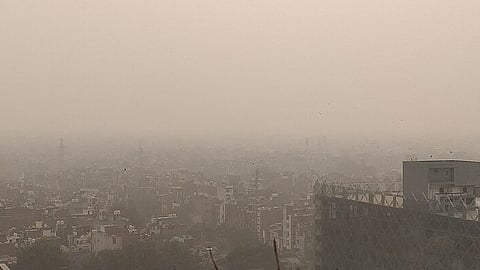
- Home
- MedBound Hub
- InternshipInternship
- BiographyBiography
- InterviewInterview
- Medicine
- Pharmacy
- Physical Therapy
- Biotechnology
- College/InstituteCollege/Institute
- Dentistry
- Blog
- Wellness & Nutrition
- Nursing
- Opinion
- Videos

Delhi recorded a daily average Air Quality Index (AQI) of 310, placing it in the ‘Very Poor’ category, according to the Central Pollution Control Board (CPCB). Forecasts from the India Meteorological Department (IMD) and the Indian Institute of Tropical Meteorology (IITM) predict that the city’s air quality will likely remain in this category in the coming days due to unfavorable weather conditions.
In response, the Sub-Committee of the Commission for Air Quality Management (CAQM) has convened to assess the air quality situation in Delhi-NCR. Following a comprehensive review, the committee announced the implementation of Stage-II actions under the revised Graded Response Action Plan (GRAP) starting at 8:00 AM on October 22, 2024. These measures come on top of Stage-I protocols already in effect.
The CAQM has instructed agencies, including Pollution Control Boards (PCBs) and the Delhi Pollution Control Committee (DPCC), to ensure strict and effective implementation of Stage-II measures. Citizens are also urged to follow specific guidelines, such as reducing personal vehicle usage, choosing public transportation, avoiding dust-generating activities, and refraining from open burning of waste.
The 11-point action plan under Stage-II focuses on curbing air pollution through intensified measures, including:
Daily mechanical/vacuum road sweeping and water sprinkling.
Use of dust suppressants along traffic corridors and disposal of collected dust at designated sites.
Enhanced inspections at construction and demolition sites to enforce dust control.
Targeted pollution abatement in identified hotspots.
Ensuring uninterrupted power supply to reduce dependence on diesel generators (DG sets).
Regulated use of DG sets across sectors, with exemptions only for critical services such as healthcare, railways, airports, and national security.
Traffic synchronization and adequate personnel deployment at congestion points.
Public alerts on pollution levels through media platforms.
Increased parking fees to discourage the use of private vehicles.
Expanded CNG and electric bus fleets and increased metro services.
RWAs to provide electric heaters to security personnel to prevent open biomass burning in winter.
The CAQM emphasized the need for collective efforts to combat air pollution and improve air quality in the region. Regular reviews of the air quality scenario will be conducted, with further measures introduced if necessary. Citizens are encouraged to stay informed and actively support the GRAP measures during this critical period. For detailed information, the revised GRAP schedule is available on the CAQM website at https://caqm.nic.in.
(Input From Various Sources)
(Rehash/Ankur Deka/MSM)
